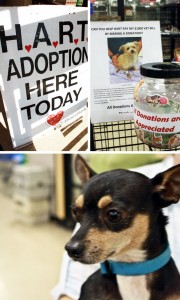by Ashley Attanucci
Web Manager
Video by Rumill Batts
Did you know that five out of ten dogs and seven out of ten cats that are sent to shelters never find homes and are euthanized? Though there are over 3,500 shelters and hundreds more rescue groups in the U.S. that aim to save animals, 11,000 cats and dogs are euthanized each day due to overcrowding alone. Organizations like HART (the Humane Animal Rescue Team), help reduce this number of destroyed, abandoned animals by combating problems locally.
HART is a registered 501(c)(3) non-profit organization run entirely by volunteer staff who work around the clock to ensure these animals a happy, healthy future. From handling paper work, managing vet care, meeting and screening hopeful adopters and corresponding with shelters and politicians to event planning, managing weekly adopt-a-pet affairs and the website, advertising and bottle-feeding a litter of newborns that would have otherwise been euthanized by a shelter- HART volunteers really do it all.
Due to all the elbow grease that goes into running a rescue, the lives of over 7,500

animals across the Metroplex have been saved and relocated into loving homes, since HART’s establishment in 1995.
“We like to think of it more as finding pets for families, more than finding families for pets,” founder Blanche Carpenter said.
She and her daughter created HART as a way to give back to the community and locally combat animal cruelty and abandonment.
Carpenter, who has been working with animal rescue teams her entire life, began this organization as a way to make a positive difference in the lives of the animals and people in her community.
“Dogs that end up at the shelter are not always problem dogs; it is usually that they have problem owners,” Carpenter said.
Due to a lapse of knowledge on an animal owner’s part, elements such as proper treatment of a pet, how to obtain a pet and spaying or neutering a pet are often overlooked causing many animals’ lives to be cut short in shelters.
“We sponsor a class at a private elementary school to educate kids on proper care for pets, including food, shelter and medical care information that can be incorporated into the math, reading or science class,” Carpenter said. “Hopefully they can influence their parents.”
In addition to reaching out to future pet owners, HART also sends out monthly newsletters, hosts no-charge spay/neuter clinics and classes and vigorously screens prospective adopters. In 1995, over 6,000 animals were euthanized in Irving alone and after seven years of HART’s endeavors, that morbid number dropped drastically to 2,991.
“Over the past ten years, we’ve seen a big improvement in the number of people who spay/neuter their pets, so we sponsor clinics for low-cost or no-cost spay/neuter for residents of Irving,” Carpenter said. “We want to promote responsible pet ownership.”
Even before spaying/neutering household pets, being a smart buyer is among the first steps to becoming a responsible pet owner. The first step is making sure that your household is prepared mentally and financially for a pet – lately, most animals that end up in shelters have been “owner released”, meaning that they have been given up by their families, usually due to economic pressures.
When looking for a pet, consider this: there are four million dogs bred in puppy mills in the U.S. each year and four million babies being born in the U.S. each year (that’s one puppy-mill puppy per newborn child). Plus, factor in the tens of thousands of homeless cats and dogs in shelters’ or rescue groups’ care, strays, and puppies born by breeders- there is a much greater supply of pets than there is demand for them.
“The beauty of having a foster arrangement is getting to know the dogs, what they like, what they don’t like, what they’re afraid of,” volunteer and foster parent Haley Anderson said, who admits that the hardest part of being a foster parent is saying good bye. “I cried and cried when [my first fostered dog] went home. But there’s no point in doing it if you’re not going to love and miss the dogs.”
HART is always looking for new volunteers or donations (tax-deductible, or donate items like bleach, toys, litter, canned dog and cat food, or towels that can be dropped off at any Adopt-A-Pet location). If you are interested, or know somebody who may be interested in volunteering, adopting or fostering a cat or dog, e-mail rescueteam@hartoftexas.org or go to www.hartoftexas.org for more information.








